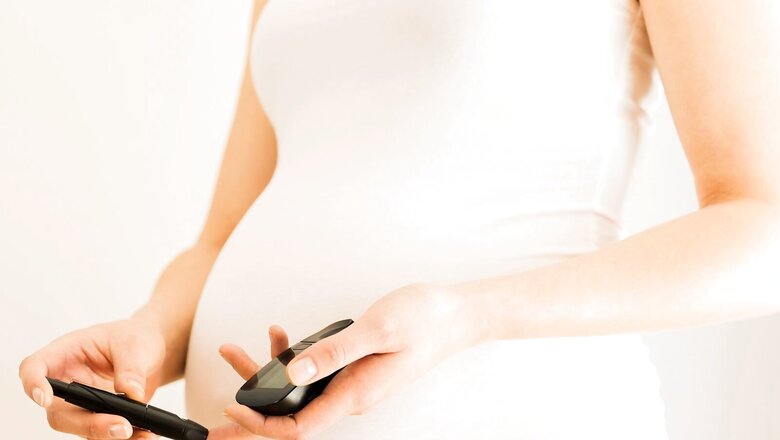
views
Whenever you go to your doctor, they invariably ask you if you have diabetes or hypertension. The reason they ask this is because it affects nearly every system in the body. The International Diabetes Federation Atlas 2019 estimated that there are roughly 77 million cases of diabetes in the adult population of India as of 20191.
But when most people think of diabetes, they think of Type 1 (autoimmune) diabetes and Type 2 (adult-onset or diet-related) diabetes. But there’s a third type of diabetes that often goes without the same scrutiny of care: gestational diabetes. Gestational diabetes is diagnosed when a woman who has never previously shown diabetes develops diabetes during pregnancy2.
Gestational Diabetes and Diabetic Retinopathy
During pregnancy, there’s a lot happening inside a woman’s body and diabetes interferes with the way the body regulates itself. If not managed or treated, gestational diabetes can harm both mother and child during pregnancy and after. For example, gestational diabetes is linked to high blood pressure during pregnancy, which increases a woman’s risk of having a stroke or blood clots during delivery. Unmanaged gestational diabetes can also cause the baby to have low blood sugar upon birth3.
Another cause for concern is diabetic retinopathy in pregnant women4. Diabetic Retinopathy is an eye condition that can cause vision loss and even complete blindness if not treated. Diabetes causes retinopathy because high blood sugar — the driver of diabetes — damages the tiny blood vessels that support the retina in the back of your eye. Over time, that damage can cause blood vessels to bleed, leak fluid, and become blocked5. What’s worse, prevalence of Diabetic Retinopathy in gestational diabetes has been reported to be between 10% and 27%6.
Scary isn’t it? But what happens if you are a Type 1 or Type II person with diabetes and are pregnant? Before insulin became available in 1922, individuals with diabetes were at very high risk of complications of pregnancy6. Although pregnancy does not have any long term effect on Diabetic Retinopathy, progression of retinopathy changes occur in 50%-70% of cases. The greatest risk of worsening occurs during the second trimester and persists for as long as 12 months postpartum7.
Who is at risk?
Research shows that women with type 1 diabetes are at higher risk. As per a research published in the Indian Journal of Ophthalmology, at first examination the prevalence of Diabetic Retinopathy in women with type 1 diabetes was 57%–62%, and 17%–28% in women with type 2 diabetes4.
Prevalence of DR in early pregnancy in type 2 diabetes has been reported as 14% while that in type 1 diabetes ranges between 34% and 72%. If you are a woman living with diabetes, ask your doctor to check for DR through the various stages of your pregnancy4.
Today, most individuals with diabetes can have a safe pregnancy and birth, similar to that of individuals without diabetes. This improvement is largely due to good blood glucose (sugar) management, which requires adherence to diet, frequent daily blood glucose monitoring, and frequent insulin adjustment4.
How can you manage your Diabetic Retinopathy risk?
As with most diseases, prevention and treatment of diabetic retinopathy starts with preventive exams. Your primary care physician or OB/GYN should screen you for gestational diabetes7. If your results come back positive, you should see your eye doctor for a dilated eye exam.
Diabetic retinopathy usually doesn’t show signs or symptoms in the early stages, but catching it early is the best way — and only way — to keep it from progressing5.
As this risk isn’t well known, Network18 launched the ‘Netra Suraksha’ – India Against Diabetes initiative, in association with Novartis, to bring awareness to Diabetic Retinopathy, the risk it poses to your vision, and the many ways to prevent loss of vision because of Diabetic Retinopathy. The initiative will conduct a series of on ground awareness camps throughout the country.
To learn more about Diabetic Retinopathy and how it affects you and your loved ones, visit https://www.news18.com/netrasuraksha/. Follow News18.com for more updates about the Netra Suraksha initiative, and prepare to involve yourself in India’s fight against Diabetic Retinopathy.
References:
- Pradeepa R, Mohan V. Epidemiology of type 2 diabetesin India. Indian J Ophthalmol. 2021 Nov;69(11):2932-2938.
- Gestational Diabetes. Available [online] at URL: https://www.mayoclinic.org/diseases-conditions/gestational-diabetes/symptoms-causes/syc-20355339. Accessed on August 3rd 2022.
- Gestational diabetes and Pregnancy. Available [online] at URL: https://www.cdc.gov/pregnancy/diabetes-gestational.html. Accessed on August 3rd 2022.
- Chandrasekaran PR, Madanagopalan VG, Narayanan R. Diabetic retinopathy in pregnancy – A review. Indian J Ophthalmol 2021;69:3015-25
- Diabetic Retinopathy. Available [online] at URL: https://www.nei.nih.gov/learn-about-eye-health/eye-conditions-and-diseases/diabetic-retinopathy. Accessed on August 3rd 2022.
- Patient education: Care during pregnancy for patients with type 1 or 2 diabetes (Beyond the Basics). Available [online] at URL: https://www.uptodate.com/contents/care-during-pregnancy-for-patients-with-type-1-or-2-diabetes-beyond-the-basics. Accessed on August 3rd 2022.
- Mallika P, Tan A, S A, T A, Alwi SS, Intan G. Diabetic retinopathy and the effect of pregnancy. Malays Fam Physician. 2010 Apr 30;5(1):2-5.
This is a partnered post.
Read the Latest News and Breaking News here

















Comments
0 comment